- Author Jason Gerald gerald@how-what-advice.com.
- Public 2023-12-16 10:50.
- Last modified 2025-01-23 12:04.
A furuncle is an abscess or skin infection that originates from within the skin, namely in the oil glands or hair follicles. Furuncles can be painful. Fortunately, furuncle formation can be prevented! The appearance of a furuncle on the skin usually begins with a red spot which eventually becomes a hard lump filled with pus. Furuncles are formed as a result of bacteria entering the skin through pores or wounds. Furuncles are more common in patients with diabetes, immune system disorders, certain skin diseases, and, in some cases, poor hygiene and malnutrition. Cystic acne can also cause furuncle formation on the face, neck, and back. Cystic acne is most common in teenagers. There are many methods of preventing furuncles that can also help with cystic acne.
Step
Method 1 of 6: Keeping the Body Clean
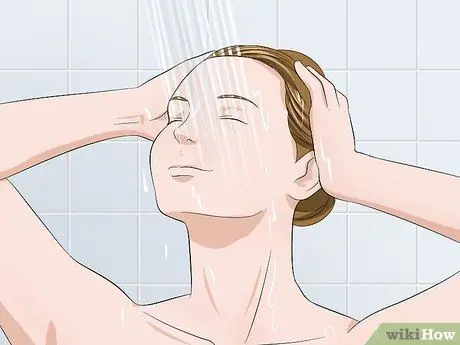
Step 1. Take a bath or bath regularly to keep your skin and hair clean
Bathing is very important, especially in hot weather because hot weather increases the chances of furuncle formation. Take a shower or bath at least once per day and after sweating. This method prevents Staphylococcus aureus or staph bacteria present on the skin from entering the pores and triggering the formation of furuncles.
Clean the body well, especially areas that are prone to furuncles, such as the face, neck, armpits, shoulders, and buttocks
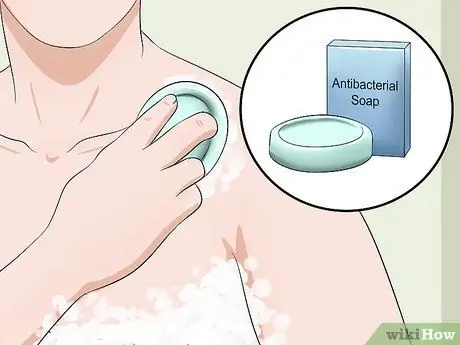
Step 2. Every day, wash your body with a mild antibacterial soap to remove any bacteria on your skin
Buy soaps, body washes, and facial cleansers that are labeled "antibacterial". These products are available under various brands in pharmacies and convenience stores.
- If certain antibacterial soaps turn out to be too dry for your skin, switch to a lighter product, such as "Cetaphil".
- Most antibacterial soaps contain the active ingredient triclosan. If you prefer to use natural products, buy a soap that contains tea tree oil, a natural antibacterial agent.
- In some cases, such as frequent furuncles or other skin infections, strong antibacterial soap, which can only be purchased with a doctor's prescription, is necessary. Consult a doctor for a prescription for a strong antibacterial soap.
- Body acne cleansers containing benzoyl peroxide can also be used.
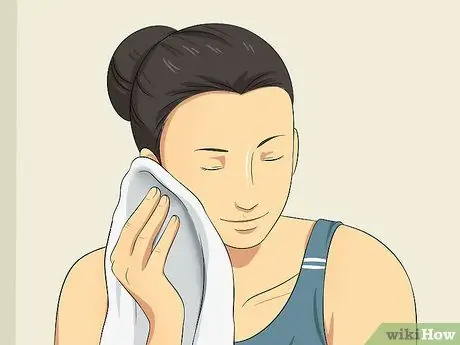
Step 3. Gently exfoliate your skin using a loofah or washcloth
This method prevents clogging of skin pores which can lead to the formation of furuncles. Do not rub the body too hard so that the skin is not damaged.
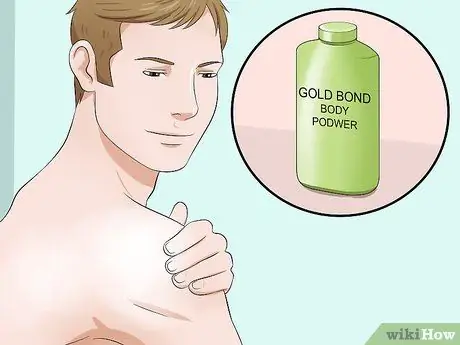
Step 4. After bathing or bathing, dry the body properly
Bacteria thrive in moist and warm environments. So, the body must be properly dried after bathing or bathing. Medicinal powder, such as "Gold Bond", or baby powder can also be used on areas of the body that tend to be wet to keep them drier throughout the day.
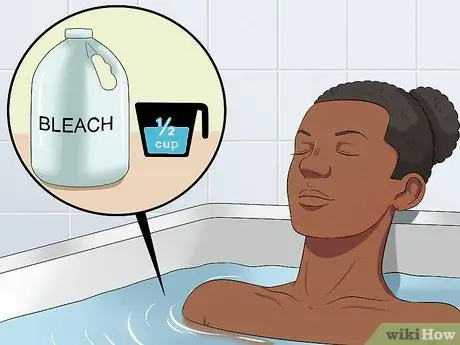
Step 5. Soak in bath water that has been bleached (bleach)
Bathing with bleached bath water is often recommended by doctors to treat skin diseases such as eczema. This method can also be used to kill bacteria on the skin that can cause furuncles. Mix 120 ml of bleach in a warm bath and soak for 10-15 minutes.
- This method should not be done more than three times per week.
- Do not dip your head in bleached bath water. The eyes, nose and mouth should not be exposed to bleached bath water.
- This method is usually safe for children. However, you should first consult with a general practitioner or pediatrician before using this method on children.

Step 6. Wear clean, loose-fitting clothes
Clothing that has been wet from sweat should not be worn again. Wear loose clothing to avoid rubbing and irritating the skin. Tight clothing blocks air from reaching the skin, which can irritate the skin and make it prone to furuncles.
Method 2 of 6: Preventing Furuncles by Shaving
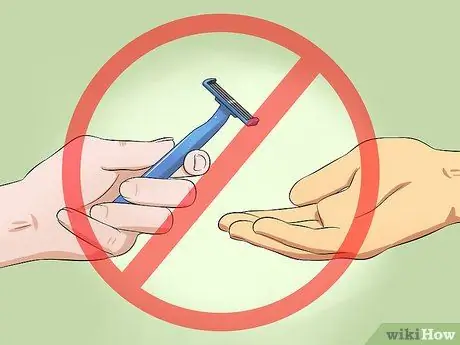
Step 1. Don't borrow razors from each other
Borrowing personal items from each other, such as razors, can lead to the transmission of staph bacteria that cause furuncles. Each needy family member should have their own razor.
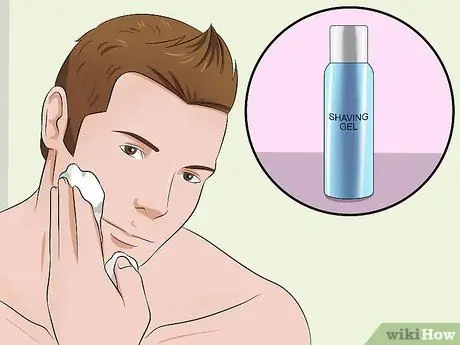
Step 2. Wet the skin, then apply shaving gel
Shaving is a major cause of hair growing into the skin, which can then become infected and become furuncles. Shaving gel applied to wet skin helps smooth the movement of the razor so it doesn't get stuck in the hair and allow the hair to re-enter the skin.
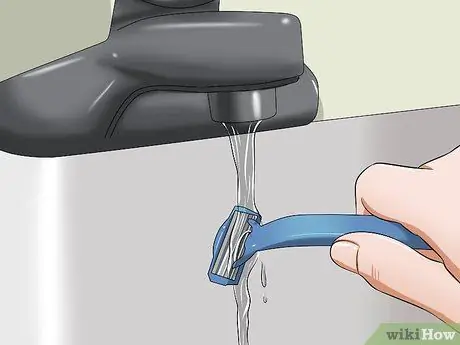
Step 3. Keep the razor sharp and clean
Wash the razor as often as possible while shaving. Disposable razors should be replaced regularly with new ones. Razor blades that can be used multiple times must be kept sharp. If the razor is sharp, the hair can be shaved without putting too much pressure on the skin, reducing the risk of slicing and ingrown hairs.
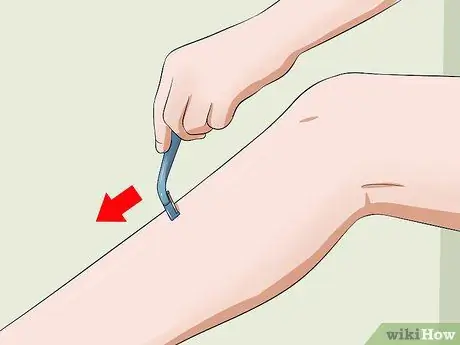
Step 4. Shave “in the direction” of the hair growing
Shaving the hair in the opposite direction of hair growth increases the chances of hair growing into the skin and furuncles forming. Therefore, shave "in the direction" of the direction of hair growth.
You may find it difficult to tell where your hair is growing, especially with curly hair. In general, shave your legs in a downward direction. Know the direction of hair growth by combing the skin with your hands

Step 5. Before shaving hair in the genital area, consider carefully
Research shows that severe MRSA (methicillin-resistant Staphylococcus aureus) infections can occur in women who shave their genitals. MRSA infection can also occur in men who "shave body hair for cosmetic reasons". In general, it's a good idea not to shave on sensitive areas of your body.
Shaving hair in the genital area causes micro-sized wounds on the skin that can be entered by staph bacteria, causing infection and furuncles. Since the genital area usually sweats more than other parts of the body, the chances of a furuncle forming in this area are also higher
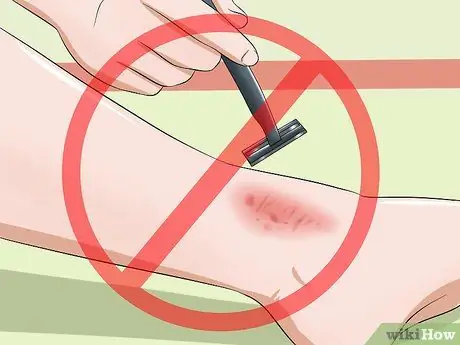
Step 6. Do not shave the hair on the inflamed skin
If you have inflamed skin or furuncles, don't shave in those areas, as this can cause bacteria and infection to spread to other parts of your body.
Method 3 of 6: Preventing the Transmission of Infection
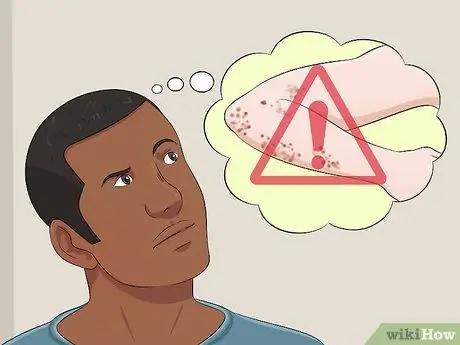
Step 1. Prevent transmission of infection
The bacterium Staphylococcus aureus, the most common cause of furuncles, is highly contagious. Staph infections are easily spread by direct contact with infected pus or skin. If you are prone to infection or come into contact with people who are prone to furuncles, take precautions to prevent staph bacteria from spreading to other people.
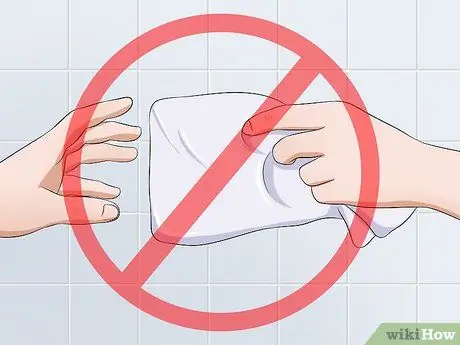
Step 2. Do not share sheets, towels, washcloths, and clothing with people who have a staph infection or furuncle
Each family member should have their own towels and washcloths which are frequently washed and stored separately.
- Pus that comes from the furuncle contains bacteria that can live on most surfaces for some time. Therefore, the pus has the potential to transmit bacteria and infections.
- Don't borrow bar soap from each other if you or a friend have a furuncle.
- Don't borrow razors and exercise equipment from each other. Both "regular" staph infections and MRSA can be transmitted through sports equipment and personal items.
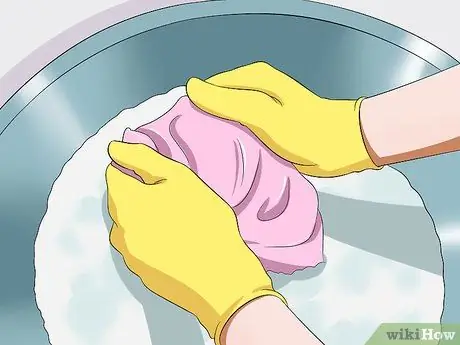
Step 3. Wash sheets and towels well and more often to kill bacteria that cause furuncles
Wash in hot water at the highest recommended temperature for fabrics being washed and use bleach to wash white sheets/towels.
- Wear gloves, for extra protection, when washing other people's sheets or towels with furuncles.
- If furuncles tend to form on your face, change your pillowcase every day to prevent the infection from spreading.
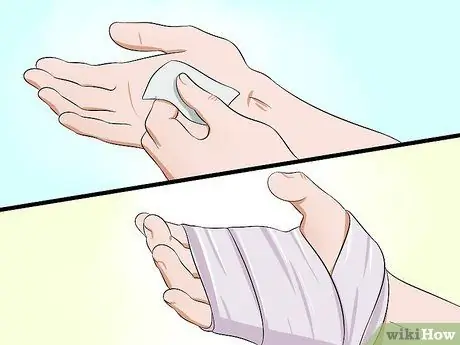
Step 4. Clean, bandage, and change dressings with new ones regularly
Pus that comes from the furuncle has the potential to transmit bacteria and cause the formation of furuncles in oneself and others who touch the fluid.
Furuncles cannot be broken. If the furuncle needs to be broken, it is best if the procedure is carried out by a medical professional. Breaking the furuncle yourself can make the wound and infection worse
Method 4 of 6: Treating Furunkel
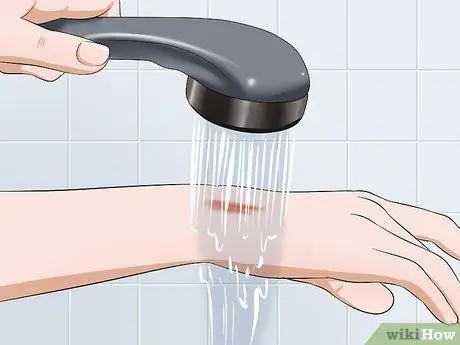
Step 1. Prevent infection by cleaning the wound thoroughly
Remove dirt and bacteria from the wound with cold running water or "wound wash" products made from physiological saline that can be purchased at pharmacies or online stores.
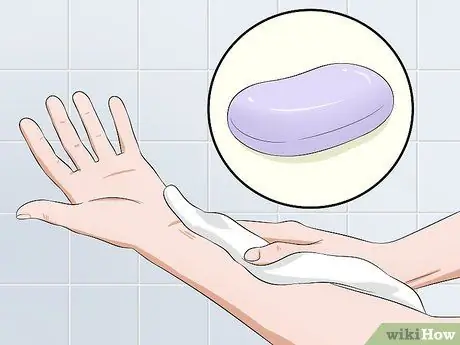
Step 2. Remove dirt and bacteria in the area around the wound with soap and a clean, soft, damp washcloth
- If there is still dirt in the wound after cleaning, pick it up with tweezers that have been sterilized with rubbing alcohol.
- If the wound is too wide or deep or there is dirt in the wound that you cannot pick up yourself, see a doctor as soon as possible.
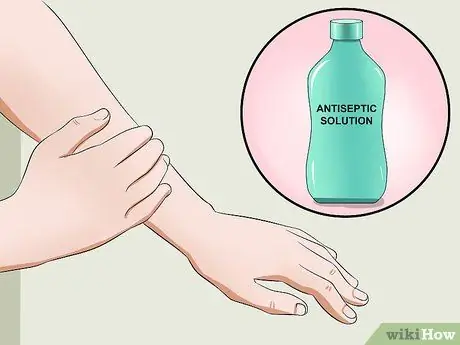
Step 3. Apply an antibiotic ointment or antiseptic solution to the wound according to the instructions for use listed on the product packaging
Antiseptic solutions can be replaced with natural ingredients, such as honey, lavender, eucalyptus, and tea tree oil. Apply one of these natural ingredients to the wound once or twice daily to prevent bacterial infection
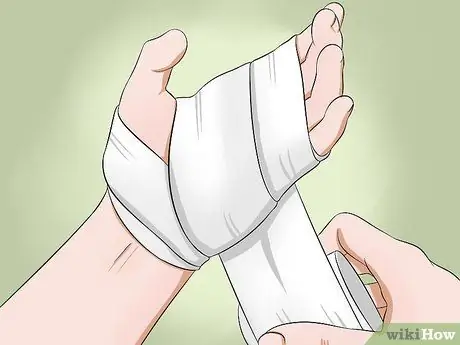
Step 4. Wrap the wound with a clean bandage and change the bandage with a new one regularly
Wounds heal faster if they are bandaged. Bandaging the wound prevents dirt and bacteria from entering and exacerbating the wound.
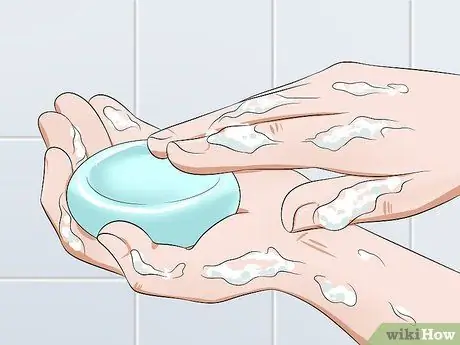
Step 5. Wash hands thoroughly before and after handling wounds and properly dispose of used bandages and gauze
In order to really clean hands, wet hands first with running water. Use soap until all parts of the hands are covered with foam. Rub all over your hands, including the backs of your hands, between your fingers, and under your nails, for at least 20 seconds. Rinse and dry your hands properly with a towel or hand dryer.
Method 5 of 6: Adopting a Healthy Lifestyle
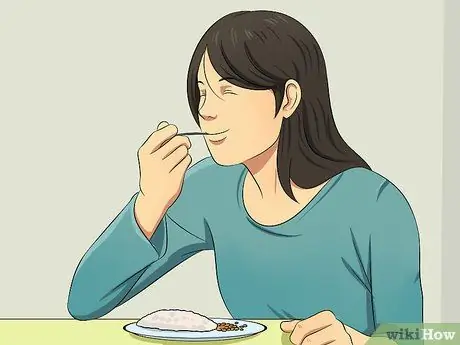
Step 1. Adopt a healthy diet
Malnutrition is one of the main causes of immune system disorders that lead to infection. Make sure the food you eat is not only in sufficient quantity, but also healthy and rich in vitamins and minerals.
- Do not eat foods that contain too much sugar, salt, or preservatives.
- Take vitamin supplements, especially vitamin C.
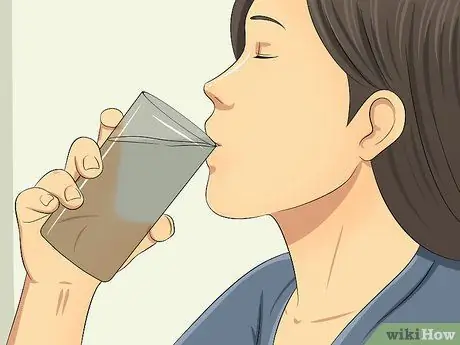
Step 2. Keep yourself hydrated, especially during hot weather
Drink lots of water to keep the skin pores clean and not clogged so that furuncles do not form. As a guide, every day, people need to drink 15-30 ml of water per 0.5 kg of body weight. So, people weighing 75 kg need to drink as much as 2-4, 5 liters of water per day.
If you are doing sports or strenuous physical activities or if the weather is hot, drink as much water as the upper limit of the amount of water your body needs each day
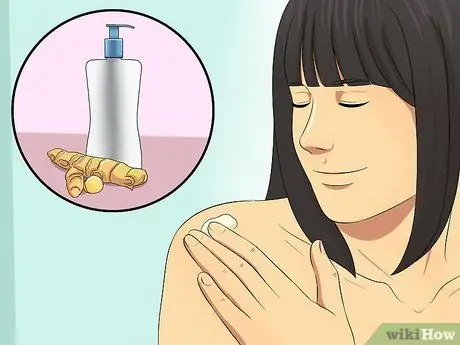
Step 3. Use one dose of turmeric daily
Turmeric contains natural anti-inflammatory and antibacterial ingredients that can heal and prevent furuncles. Lotions or creams containing turmeric can help the healing process of various wounds, such as furuncles. Although there is no scientific evidence to show that consuming turmeric helps heal furuncles, turmeric contains antioxidants and helps prevent various diseases, such as heart attacks and strokes. So, feel free to cook using turmeric as much as possible.

Step 4. Exercise for 20-30 minutes per day
Exercising at moderate intensity has been shown to be effective in boosting the immune system. Exercise for at least 20-30 minutes every day to keep your skin healthy and free from infection.
- If you haven't exercised in a long time, start with light exercise. Doing walking exercise for 20 minutes, or even dividing the 20 minute duration into two sessions (10 minutes each), is enough to boost the immune system.
- Exercising doesn't have to be a burden. Do fun activities that require your body to be active, such as dancing or going to the park with your child.

Step 5. Relieve stress
People who are very stressed are at a higher risk of developing furuncles and various other diseases. If you can, take time each day to relax. Do activities that relieve stress, such as exercise, yoga, meditation, or tai chi.
Laughter is another very effective way to relieve stress. Have a friend tell a funny story or relax by watching a comedy show on TV after work
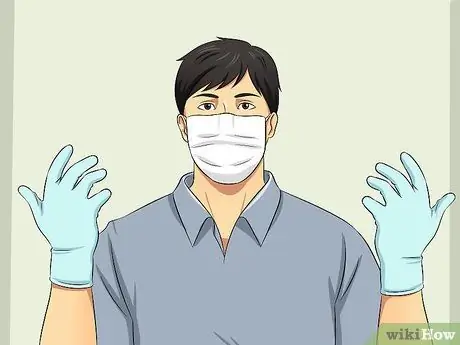
Step 6. Stay away from harmful chemicals
In some cases, furuncles form as a result of exposure to irritating chemicals at home or at work. Examples of chemicals that can cause skin diseases include tar and lubricating oil. Wear protective equipment when using chemicals. Immediately wash the body parts that are exposed to chemicals.
Method 6 of 6: Using Medical Treatment
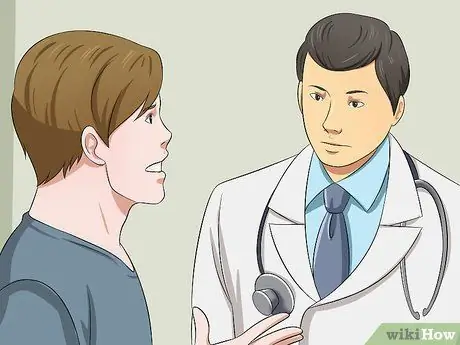
Step 1. See a doctor
If the furuncle appears frequently or doesn't heal despite treatment, check with your doctor to rule out the possibility that the furuncle was triggered by another disease, such as infection, anemia, or diabetes. Doctors can also prescribe and recommend preventive and treatment measures, such as oral antibiotics, topical medications, and iron supplements.
Consult a doctor if the furuncle recurs, lasts more than two weeks, appears on the face or back, is painful, or is accompanied by fever
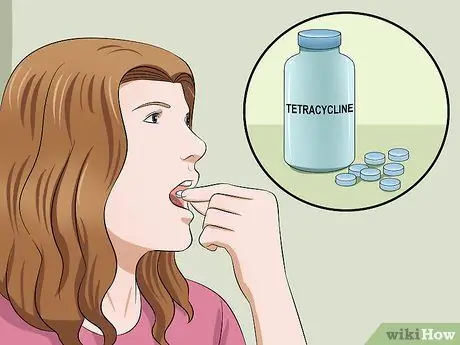
Step 2. Take oral antibiotics
Some people who experience frequent furuncles or cystic acne may need to take oral antibiotics to treat the infection in the body that is causing the condition.
Doctors usually prescribe taking antibiotics, such as tetracycline, doxycycline, or erythromycin, for six months to treat furuncles and acne
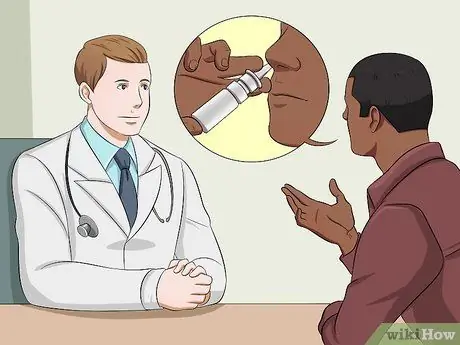
Step 3. Talk to your doctor about nasal antibiotics
Some people are carriers of staph infections, bacteria that normally live in the nose. If you are a carrier of a staph infection, your doctor may prescribe a nasal spray or antibiotic cream daily for a few days. This method helps eradicate staph colonies in the nose and prevents the infection from spreading to the skin and other people through sneezing, exhaling, and so on.
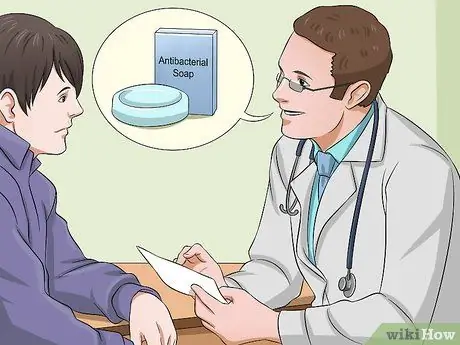
Step 4. Talk to your doctor about topical medications and antibacterial soaps that must be purchased with a doctor's prescription
If regular antibacterial soap, which can be purchased without a prescription, proves to be ineffective or irritates the skin, your doctor may prescribe another medication that is more effective or mild. Your doctor may also prescribe a topical antibiotic to apply to open wounds or areas of the skin that are prone to furuncles.
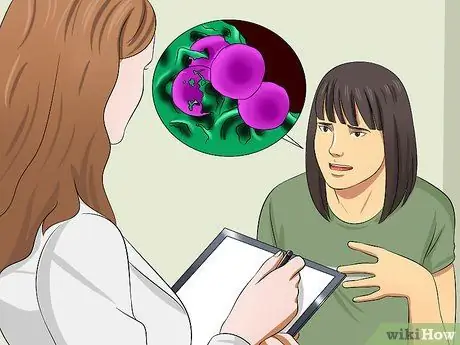
Step 5. Talk to your doctor about MRSA
MRSA (methicillin-resistant Staphylococcus aureus) is a type of staph bacteria that has become resistant to antibiotics, making it more difficult to treat. MRSA is often transmitted in hospitals and other health facilities, such as nursing homes. However, MRSA can also be transmitted through direct contact with other people, for example when playing sports.
Furuncles are usually caused by an MRSA infection. Other symptoms to watch out for include abscesses (accumulation of pus in the skin), carbuncles (lumps filled with pus and fluid), and impetigo (thick, crusty, itchy furuncles). If you suspect you have an MRSA infection, talk to your doctor as soon as possible
Related article
- How to Overcome Boils
- How to Treat Blood Blisters (Blood Blisters)
- How to Treat Infectious Wounds (cold sore or fever blister) Herpes Simplex
- How to get rid of hair that grows into the skin






